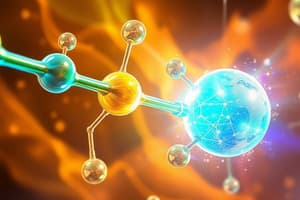Podcast
Questions and Answers
Is HF (hydrogen fluoride) polar or nonpolar?
Is HF (hydrogen fluoride) polar or nonpolar?
- Nonpolar
- Polar (correct)
Is H2O (water) polar or nonpolar?
Is H2O (water) polar or nonpolar?
- Polar (correct)
- Nonpolar
Is NH3 (ammonia) polar or nonpolar?
Is NH3 (ammonia) polar or nonpolar?
- Nonpolar
- Polar (correct)
Is HCl (hydrogen chloride) polar or nonpolar?
Is HCl (hydrogen chloride) polar or nonpolar?
Is PCl3 (phosphorous trichloride) polar or nonpolar?
Is PCl3 (phosphorous trichloride) polar or nonpolar?
Is C (pure unbonded carbon) polar or nonpolar?
Is C (pure unbonded carbon) polar or nonpolar?
Is H2S (hydrogen sulfide) polar or nonpolar?
Is H2S (hydrogen sulfide) polar or nonpolar?
Is CCl4 (carbon tetrachloride) polar or nonpolar?
Is CCl4 (carbon tetrachloride) polar or nonpolar?
Is NaCl (sodium chloride) polar or nonpolar?
Is NaCl (sodium chloride) polar or nonpolar?
Is I2 (molecular iodine) polar or nonpolar?
Is I2 (molecular iodine) polar or nonpolar?
Is CH3OH (methanol) polar or nonpolar?
Is CH3OH (methanol) polar or nonpolar?
Are all molecules with formula types like N2, H2, O2, CO2, Cl2 polar or nonpolar?
Are all molecules with formula types like N2, H2, O2, CO2, Cl2 polar or nonpolar?
Is CH3Cl (chloromethane) polar or nonpolar?
Is CH3Cl (chloromethane) polar or nonpolar?
Is C6H12O6 (glucose) polar or nonpolar?
Is C6H12O6 (glucose) polar or nonpolar?
Is CH3CH2OH (ethanol) polar or nonpolar?
Is CH3CH2OH (ethanol) polar or nonpolar?
Is CH3COOH (acetic acid) polar or nonpolar?
Is CH3COOH (acetic acid) polar or nonpolar?
Are noble gases polar or nonpolar?
Are noble gases polar or nonpolar?
Is C6H6 (benzene) polar or nonpolar?
Is C6H6 (benzene) polar or nonpolar?
Is CH4 (methane) polar or nonpolar?
Is CH4 (methane) polar or nonpolar?
Is BF3 (boron trifluoride) polar or nonpolar?
Is BF3 (boron trifluoride) polar or nonpolar?
Is SF6 (sulfur hexafluoride) polar or nonpolar?
Is SF6 (sulfur hexafluoride) polar or nonpolar?
Is C6H14 (hexane) polar or nonpolar?
Is C6H14 (hexane) polar or nonpolar?
Is C2H2 (acetylene) polar or nonpolar?
Is C2H2 (acetylene) polar or nonpolar?
Flashcards
Polar Molecules
Polar Molecules
Molecules with an uneven distribution of charge due to differing electronegativities.
Hydrogen Fluoride (HF)
Hydrogen Fluoride (HF)
A polar molecule with a strong dipole due to fluorine's high electronegativity.
Water (H2O)
Water (H2O)
A highly polar molecule essential for its solvent properties and capability to form hydrogen bonds.
Ammonia (NH3)
Ammonia (NH3)
Signup and view all the flashcards
Hydrogen Chloride (HCl)
Hydrogen Chloride (HCl)
Signup and view all the flashcards
Phosphorous Trichloride (PCl3)
Phosphorous Trichloride (PCl3)
Signup and view all the flashcards
Hydrogen Sulfide (H2S)
Hydrogen Sulfide (H2S)
Signup and view all the flashcards
Methanol (CH3OH)
Methanol (CH3OH)
Signup and view all the flashcards
Chloromethane (CH3Cl)
Chloromethane (CH3Cl)
Signup and view all the flashcards
Ethanol (CH3CH2OH)
Ethanol (CH3CH2OH)
Signup and view all the flashcards
Acetic Acid (CH3COOH)
Acetic Acid (CH3COOH)
Signup and view all the flashcards
Nonpolar Molecules
Nonpolar Molecules
Signup and view all the flashcards
Carbon (C)
Carbon (C)
Signup and view all the flashcards
Carbon Tetrachloride (CCl4)
Carbon Tetrachloride (CCl4)
Signup and view all the flashcards
Molecular Iodine (I2)
Molecular Iodine (I2)
Signup and view all the flashcards
Noble Gases
Noble Gases
Signup and view all the flashcards
Benzene (C6H6)
Benzene (C6H6)
Signup and view all the flashcards
Methane (CH4)
Methane (CH4)
Signup and view all the flashcards
Boron Trifluoride (BF3)
Boron Trifluoride (BF3)
Signup and view all the flashcards
Sulfur Hexafluoride (SF6)
Sulfur Hexafluoride (SF6)
Signup and view all the flashcards
Hexane (C6H14)
Hexane (C6H14)
Signup and view all the flashcards
Acetylene (C2H2)
Acetylene (C2H2)
Signup and view all the flashcards
Study Notes
Polar Molecules
- HF (hydrogen fluoride) exhibits polarity due to the high electronegativity of fluorine, creating a dipole moment.
- H2O (water) is a highly polar molecule, essential for its solvent properties and ability to form hydrogen bonds.
- NH3 (ammonia) is polar, characterized by a nitrogen atom with a lone pair, leading to a distinct dipole.
- HCl (hydrogen chloride) is polar because it possesses a significant electronegativity difference between hydrogen and chlorine.
- PCl3 (phosphorous trichloride) is polar due to an asymmetrical shape and the electronegativity of chlorine.
- H2S (hydrogen sulfide) is polar because of the electronegativity difference between hydrogen and sulfur, resulting in a bent geometry.
- CH3OH (methanol) is polar owing to the hydroxyl group (-OH) that creates a strong dipole.
- CH3Cl (chloromethane) is polar due to the electronegativity of chlorine affecting molecular symmetry.
- CH3CH2OH (ethanol) is a polar molecule, which also contains a hydroxyl group, enabling hydrogen bonding.
- CH3COOH (acetic acid) is polar with a functional carboxyl group contributing to its polarity.
Nonpolar Molecules
- Pure unbonded carbon (C) is nonpolar as there are no differences in electronegativity.
- CCl4 (carbon tetrachloride) is nonpolar due to its symmetrical tetrahedral shape, resulting in cancellation of dipoles.
- I2 (molecular iodine) is nonpolar, as it is composed of two identical atoms sharing electrons equally.
- Molecules like N2, H2, O2, CO2, and Cl2 are nonpolar; they consist of the same element or have symmetrical arrangements.
- C6H12O6 (glucose) is mistakenly noted as nonpolar; it is in fact polar due to multiple hydroxyl groups.
- Any noble gas is inherently nonpolar because of a complete valence shell and lack of bonds.
- C6H6 (benzene) is nonpolar owing to its symmetrical ring structure despite having C-H bonds.
- CH4 (methane) is nonpolar due to its symmetrical tetrahedral geometry.
- BF3 (boron trifluoride) is nonpolar because of its trigonal planar symmetry, leading to balanced charge distribution.
- SF6 (sulfur hexafluoride) is nonpolar, with an octahedral structure that cancels dipole moments.
- C6H14 (hexane) is nonpolar, a straight-chain hydrocarbon with a symmetrical structure.
- C2H2 (acetylene) is nonpolar; it has a linear structure and symmetrical electron distribution.
Studying That Suits You
Use AI to generate personalized quizzes and flashcards to suit your learning preferences.




